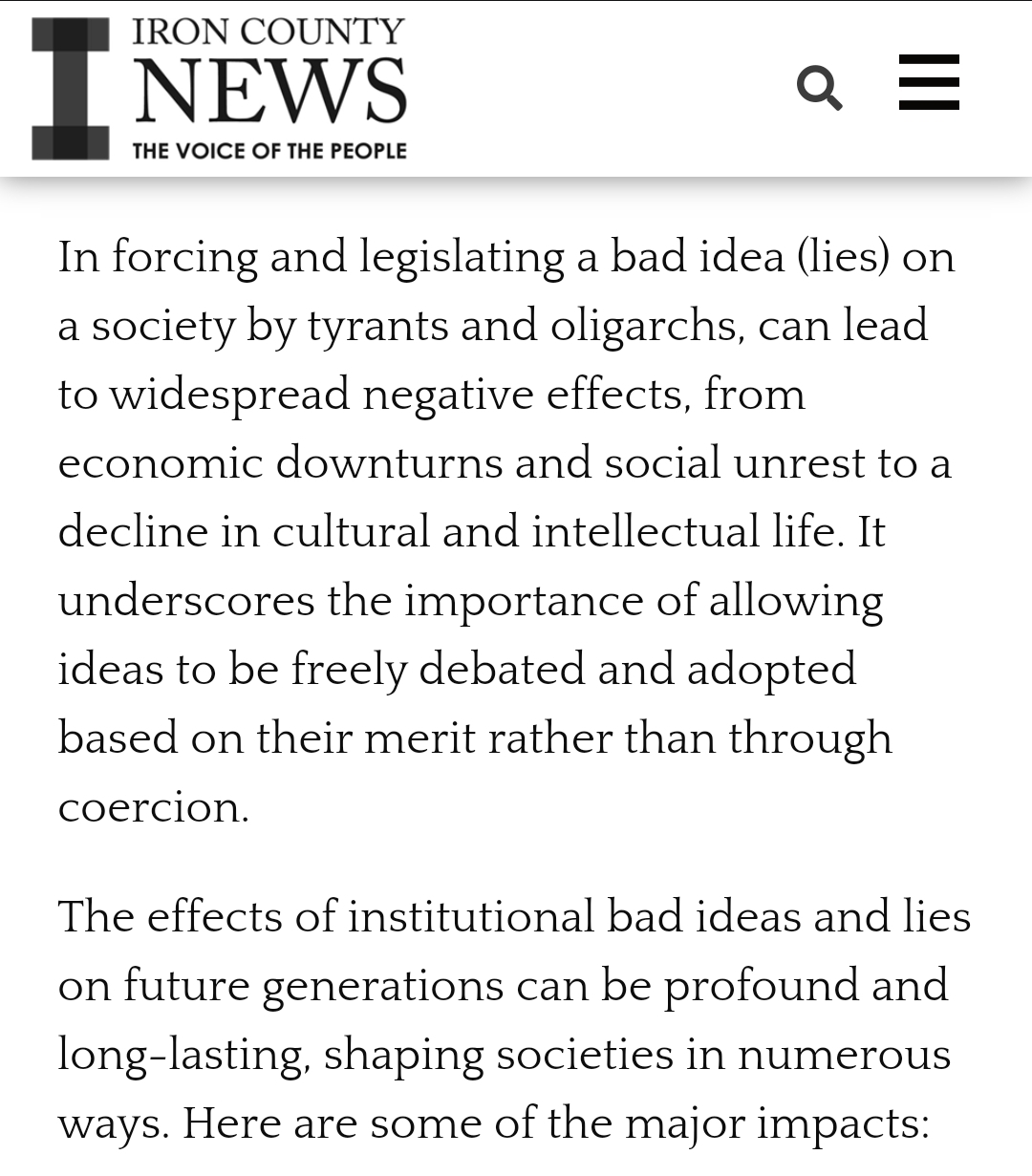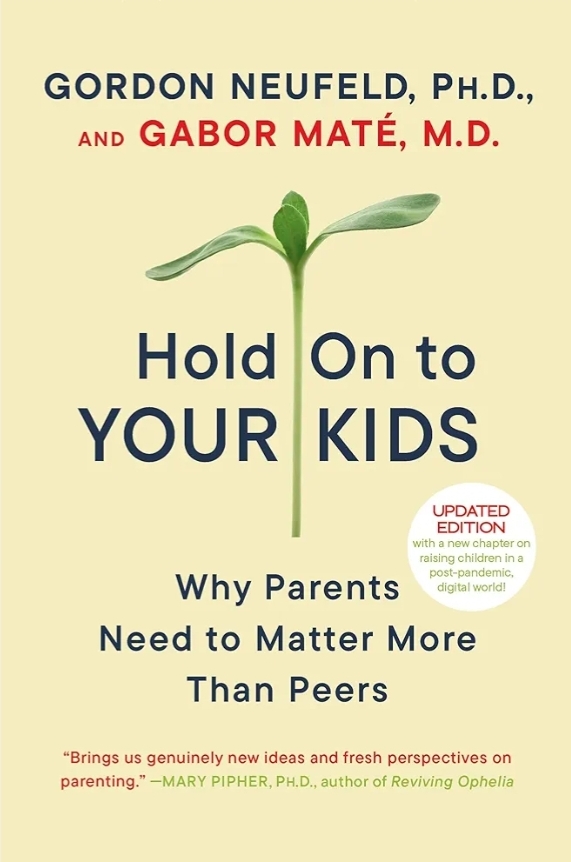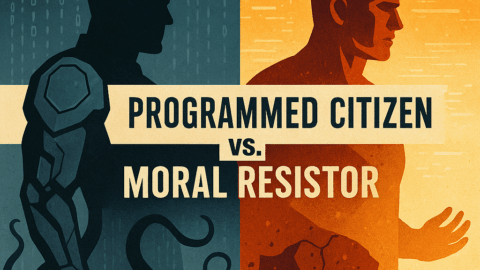“Hold On to Your Kids: Why Parents Need to Matter More Than Peers” by Dr. Gordon Neufeld and Dr. Gabor Maté is a groundbreaking book that explores the challenges of parenting in a world where children’s attachment to their peers often takes precedence over their attachment to their parents. The authors argue that this shift in attachment focus—what they call “peer orientation”—is detrimental to healthy child development and offers strategies for parents to re-establish their role as the primary influence in their children’s lives.
Key Themes and Concepts:
- Attachment Theory:
- The book is grounded in attachment theory, which posits that children are biologically programmed to form strong emotional bonds, or attachments, primarily with their caregivers. These attachments are crucial for emotional, social, and psychological development, providing a secure base from which children can explore the world, learn, and grow.
- Peer Orientation:
- Neufeld and Maté introduce the concept of peer orientation, where children turn to their peers for emotional support, guidance, and identity instead of their parents. The authors argue that this shift is a relatively modern phenomenon exacerbated by societal changes, such as increased time spent in daycare, the rise of digital technology and social media, and cultural trends that undermine the authority of parents.
- When children are peer-oriented, they become more influenced by the behaviors, values, and attitudes of their peers rather than their parents, leading to a host of problems, including increased anxiety, aggression, and difficulties with self-regulation and emotional resilience.
- The Impact of Peer Orientation:
- The book explains how peer orientation affects various aspects of a child’s development:
- Emotional Development: Children who are peer-oriented may struggle with emotional regulation, as they lack the guidance and security that come from a strong attachment to a stable, loving adult.
- Social Development: Peer-oriented children may have trouble forming healthy relationships because they are more focused on fitting in or seeking validation from peers rather than developing a genuine sense of self.
- Behavioral Issues: The authors argue that peer orientation is linked to increased behavioral problems, such as defiance, bullying, and disengagement from family and school.
- Learning and Academic Performance: When children’s primary attachments are with peers, they may become more distracted and less motivated to learn, as their sense of identity and belonging is tied to peer acceptance rather than a natural curiosity or the values promoted by their family.
- The book explains how peer orientation affects various aspects of a child’s development:
- Causes of Peer Orientation:
- The book discusses several factors that contribute to peer orientation:
- Societal Changes: The authors cite increased time spent away from parents due to work, daycare, and school, which weakens the natural attachment between parents and children.
- Technology and Media: Digital devices, social media, and entertainment often promote peer culture and reduce meaningful interactions between children and parents.
- Cultural Norms: Modern society often promotes independence at an early age, discouraging dependency on parents and encouraging peer-based relationships instead.
- The book discusses several factors that contribute to peer orientation:
- The Role of Parents and Caregivers:
- Neufeld and Maté argue that parents need to reclaim their role as the primary attachment figures in their children’s lives. To do so, they must create an environment where children feel safe, loved, and understood.
- The authors emphasize that attachment is not about control or coercion but about providing a secure base from which children can mature and develop into independent adults.
Strategies for Reconnecting with Children:
- Cultivate Emotional Closeness:
- Prioritize Connection: Make time to connect with your child through shared activities, conversations, and simple moments of affection and attention. Focus on building a deep emotional bond rather than just managing behavior.
- Attachment Rituals: Establish daily or weekly routines that reinforce emotional bonds, such as family dinners, bedtime stories, or regular one-on-one time.
- Be the Primary Source of Guidance and Values:
- Be a North Star: Be the main source of moral guidance, values, and cultural norms for your child. Children need their parents to serve as their “compass point” for understanding the world, rather than relying on peers for this guidance.
- Set Boundaries and Limits: Provide clear boundaries and expectations while maintaining a warm, nurturing environment. Boundaries are important for children to feel safe and understand limits.
- Protect from Premature Peer Influence:
- Delay Peer Exposure: Minimize exposure to peer environments, such as early, extended daycare or overreliance on peer socialization, during the formative years. Encourage family-based activities and adult-led communities where children can form attachments with adults.
- Monitor Digital Consumption: Limit screen time and exposure to digital media that reinforce peer culture. Encourage face-to-face interactions and real-world activities that strengthen family bonds.
- Create a Village:
- Build a Supportive Network: Surround your child with adults who share your values and whom you trust. Form a community of caregivers, family members, teachers, and mentors who can reinforce the importance of parental attachment.
- Involve Extended Family: Encourage involvement from extended family members, such as grandparents, aunts, and uncles, to strengthen the attachment network around the child.
- Foster Emotional Maturity:
- Model Emotional Regulation: Demonstrate healthy ways of handling emotions and conflicts. Teach your child to recognize and express their feelings in constructive ways.
- Encourage Reflection: Help children understand their emotions and the impact of their actions, fostering self-awareness and empathy.
“Hold On to Your Kids” is a call to action for parents to reclaim their role as the primary influence in their children’s lives, countering the negative effects of peer orientation. Neufeld and Maté argue that a strong parent-child attachment is crucial for healthy development, emotional resilience, and a secure sense of self. By focusing on creating emotional closeness, setting clear boundaries, and protecting children from premature peer influence, parents can help their children grow into well-adjusted, independent, and emotionally mature adults.
The book emphasizes that parenting is about connection and attachment, not control, and that the key to raising healthy, happy children lies in fostering secure, loving relationships within the family.
In the article, Let the Best Ideas Win By Public Debate, But Don’t Legislate Bad Ideas Into Law & Society. We address the negative consequences an institutionalized bad idea has on society from children to families and America in general.

Gordon Neufeld and co-author Gabor Maté provide a critique of Judith Rich Harris’s book “The Nurture Assumption,” arguing that Harris’s conclusions are fundamentally flawed.
Harris’s book, published in 1998, challenges the conventional belief that parents play the most critical role in shaping their children’s development. Instead, Harris argues that peers have a far greater influence on a child’s personality, behavior, and socialization.
Neufeld systematically deconstructs Harris’s arguments, explaining why he believes her conclusions are not only incorrect but also dangerous to healthy child development. Here’s a detailed examination of how Neufeld addresses and refutes Harris’s ideas:
1. Overview of Judith Harris’s Argument in “The Nurture Assumption”:
- The Core Thesis:
- Harris posits that while genetics (nature) determines much of a child’s traits and behavior, the socialization process (nurture) happens primarily through peer interactions, not parental influence. She argues that children adapt to their peer groups and that parents have little long-term impact on their children’s personalities or behaviors.
- Downplaying Parental Influence:
- Harris suggests that what parents do—how they raise their children, the environment they create, and the parenting strategies they employ—has minimal influence on how children turn out in adulthood. Instead, she maintains that the peer group has the most substantial impact on a child’s social behavior, attitudes, and development.
2. Neufeld’s Critique of Harris’s Core Ideas:
Neufeld argues that Harris’s conclusions are based on a misinterpretation of research and a misunderstanding of child development principles. His critique of “The Nurture Assumption” centers on several key points:
a. The Importance of Attachment:
- Attachment Theory Overlooked:
- Neufeld argues that Harris largely ignores the fundamental role of attachment theory, which posits that children are biologically programmed to form strong emotional bonds with their primary caregivers (usually their parents). These bonds are essential for healthy development, providing children with a sense of security, identity, and self-worth.
- According to attachment theory, when these primary bonds are strong and secure, children develop the confidence to explore the world and form relationships with others. Neufeld believes that Harris fails to recognize the importance of these primary attachments and their influence on a child’s development.
- Misunderstanding Socialization:
- Neufeld criticizes Harris’s assumption that socialization—the process by which children learn social norms and behaviors—happens primarily through peers. He argues that healthy socialization begins with strong attachment relationships with adults, who provide the guidance, modeling, and emotional support children need to navigate social interactions. When children are securely attached to their parents, they can engage with peers from a position of confidence and stability.
b. The Impact of Peer Orientation:
- Peer Orientation Misunderstood:
- Neufeld introduces the concept of peer orientation as a counterpoint to Harris’s claims. He argues that when children become too dependent on their peers for validation, identity, and a sense of belonging, it can be detrimental to their development. Peer orientation can lead to increased aggression, anxiety, emotional instability, and a lack of respect for authority.
- He contends that Harris’s book mistakenly views peer orientation as a natural and beneficial process, while in reality, it represents a breakdown in the natural parent-child attachment that is crucial for healthy development.
c. Misinterpretation of Research Findings:
- Flawed Interpretation of Data:
- Neufeld argues that Harris misinterprets and selectively uses research to support her arguments. He claims that while Harris relies heavily on studies showing that children resemble their peers in behavior, she ignores the fact that these behaviors often reflect deeper attachment issues. For example, children who are insecurely attached to their parents may be more susceptible to negative peer influences.
- Neufeld points out that many of the studies Harris cites are correlational and do not prove causation. He suggests that Harris oversimplifies complex developmental processes by attributing too much influence to peers while neglecting other factors, such as the quality of the parent-child relationship.
d. The Role of Parents in Identity Formation:
- Parents as Primary Guides:
- Neufeld asserts that parents, not peers, are the primary guides in a child’s life, especially in the early years. He argues that children look to their parents for cues about how to behave, what to value, and how to interact with others. These early lessons form the foundation for the child’s future social interactions and personal identity.
- Neufeld emphasizes that the attachment relationship between parent and child is the most critical factor in a child’s development. Secure attachment allows children to explore the world, take risks, and develop resilience, all of which are essential for healthy development.
- Identity Distortion Due to Peer Orientation:
- He suggests that when children rely too heavily on their peers for guidance and validation, it can lead to an unstable sense of self. Unlike parents, who offer unconditional love and support, peers often provide conditional acceptance based on conformity to group norms. This dynamic can cause children to suppress their authentic selves to gain peer approval, leading to identity confusion and insecurity.
e. The Danger of Minimizing Parental Influence:
- Erosion of Parental Authority:
- Neufeld warns that Harris’s arguments could lead to the erosion of parental authority and responsibility. If parents believe they have little influence over their children’s development, they may become less involved, less engaged, or less willing to assert their authority. This hands-off approach can leave children without the guidance and support they need to thrive.
- Neufeld argues that this mindset is harmful because it undermines the essential role of parents in providing emotional security, moral guidance, and social modeling. He emphasizes that parents should be empowered to play an active, authoritative role in their children’s lives.
- Encouraging a Dangerous Social Trend:
- Neufeld and Maté also suggest that Harris’s ideas reinforce a dangerous social trend in which children are encouraged to detach from their parents and become prematurely independent. They argue that this trend leads to increased anxiety, depression, and behavioral issues, as children lack the emotional support and secure attachment they need for healthy development.
f. Long-Term Consequences of Misplaced Beliefs:
- Emotional and Behavioral Problems:
- Neufeld asserts that when children are raised in environments that minimize the importance of parental influence, they are more likely to develop emotional and behavioral problems. Peer-oriented children may engage in riskier behaviors, struggle with authority, and experience more difficulty forming healthy adult relationships.
- Loss of Societal Cohesion:
- Neufeld also argues that Harris’s perspective undermines the fabric of society. If the role of parents is diminished and children primarily socialize through their peers, the result can be a generation of individuals who are less grounded, less secure, and less capable of forming strong, healthy communities.
Conclusion: Neufeld’s Perspective on “The Nurture Assumption”
Gordon Neufeld’s critique of “The Nurture Assumption” centers on his belief that Judith Harris fundamentally misunderstands the developmental importance of parental attachment. He argues that her reliance on peer influence as the primary driver of child development ignores the critical role parents play in providing security, emotional support, and guidance. Neufeld maintains that healthy development is rooted in strong parent-child bonds, and when these bonds are weakened, children may become overly reliant on peers, leading to a range of emotional, behavioral, and social problems.
Neufeld’s work urges a return to prioritizing the parent-child relationship over peer relationships, asserting that parents need to remain the most important figures in their children’s lives to foster healthy, balanced development.







